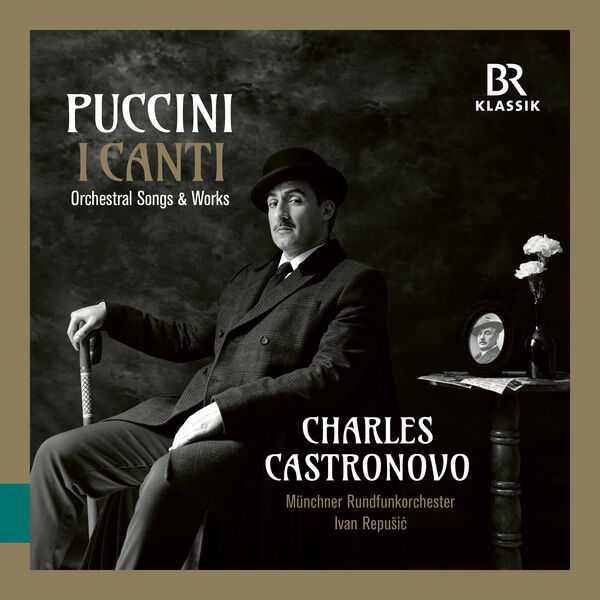

Composer: Giacomo Antonio Domenico Michele Secondo Maria Puccini
Performer: Charles Castronovo
Orchestra: Münchner Rundfunkorchester
Conductor: Ivan Repušić
Format: FLAC (tracks)
Label: BR Klassik
Catalogue: 900349
Release: 2024
Size: 1.19 GB
Recovery: +3%
Scan: yes
I Canti (Arr. for Voice & Orchestra by Johannes X. Schachtner)
01. A te, SC 8
02. Salve Regina, SC 39
03. Ad una morta!, SC 41
04. Mentìa l’avviso, SC 54
05. Storiella d’amore, SC 40
06. Sole e amore, SC 63
07. Avanti Urania!, SC 68
08. Inno a Diana, SC 70
09. E l’uccellino, SC 71
10. Terra e mare, SC 73
11. Canto d’anime, SC 75
12. Dios y patria, SC 77a
13. Casa mia, casa mia, SC 79
14. Sogno d’or, SC 82
15. Inno a Roma, SC 90
16. Morire?, SC 89
17. Preludio sinfonico, SC 32
18. Capriccio sinfonico, SC 55
19. Crisantemi, SC 65 (Arr. for String Orchestra by Lucas Drew)
“Giacomo Puccini wrote only a few works for voice with piano accompaniment. Eleven songs were published during his lifetime; others remained lost for over a century. In 2010, a first critical edition of the total of sixteen vocal compositions was presented. Several of them are closely related to Puccini’s operas and had already been written during his studies in Milan. It was this edition that inspired Johannes X. Schachtner to arrange the piano score-like accompaniments for orchestra. In early February 2023, the US tenor Charles Castronovo sang these sixteen songs for the first time together with the Münchner Rundfunkorchester conducted by Ivan Repušić. Charles Castronovo has worked with the Münchner Rundfunkorchester ever since a concert performance of Mozart’s La clemenza di Tito in 2006. In the 2023/24 season, he will return to Munich as the orchestra’s “Artist in Residence”. BR-KLASSIK now presents the CD “Giacomo Puccini – I Canti”. Puccini’s piano songs are entirely in the Italian tradition of the 19th century. Most Italian opera composers – from Rossini, Donizetti and Bellini to Verdi – also wrote lieder, but unlike the German art song, these were always closely related to bel canto, the “beautiful song”. Priority is given here to an irresistible melos over a mostly simple accompaniment, which is nevertheless supported by charming harmonies; hardly ever do these Italian songs eschew the dramatic flair of the opera composer. In the course of his work, Johannes X. Schachtner was increasingly fascinated by the way in which these songs, which were written for very different occasions and have no contextual connection, nevertheless convey the highly exciting story of a composer’s life. From the youthful, almost innocent love song “A te” to Puccini’s last songs with the impressive “Morire?” – but also small album leaves such as the setting of the Italian proverb “Casa mia, casa mia”, which is only a few bars long. Some songs also afford us a glimpse into the workshop of the composer Puccini, who made use of his earlier pieces in his operas. For example, a melody from the song “Mentía l’avviso”, which was part of his final examination at the Milan Conservatory, became the famous aria “Donna non vidi mai” of Des Grieux in his opera Manon Lescaut a few years later. The sixteen songs arranged with orchestral accompaniment are complemented by orchestral works by Puccini, written during his studies at the Milan Conservatory. They reflect the musical spirit of the time that shaped the young composer – ranging from the melodic influences of his teacher Amilcare Ponchielli to the impressions that the music of Richard Wagner left on him. Themes from these pieces also recur in his operas. Puccini’s enthusiasm for Wagner shimmers through unmistakably in the “Preludio sinfonica”. In the “Capriccio sinfonica” one can hear a whole reservoir of later opera melodies, the most striking of which (almost note-for-note) is the opening of La bohème. Puccini’s funeral music “Crisantemi”, composed for string quartet, was written before his first resounding success with Manon Lescaut, where melodies from it recur. Puccini wrote the piece in memory of Amadeo di Savoia, Duke of Aosta, who died on January 18, 1890, and the morbid scent of the cemetery flowers pervades the three-part Andante movement.”
This release showed up on classical best-seller lists in early 2024, and one wonders whether the buyers were influenced by the main graphics, referring only to Puccini “Orchestral Songs & Works”; listeners may have been intrigued by the idea of hitherto unknown orchestral songs by Puccini. He never wrote any such thing; heard here are transcriptions of songs for voice and piano by the student Puccini, plus a few early orchestral works and a string-orchestra version of the string quartet Crisantemi, which has been done before. The music here, transcriptions of music that is all-but-unknown to begin with, certainly could be described as niche, but it is interesting for Puccini fans and others, for it has the flavor of a labor of love. Transcriber Johannes X. Schachtner teases out the hints of the mature Puccini in these songs, many of which sound quite operatic even though Puccini had yet to write a single note of opera. Sample the full-scale “orchestral” introduction in Mentia all’avviso, written for the composer’s final exams at the Milan Conservatory, or the little scrap of stage action represented by Casa mia, casa mia. Schachtner’s work is retrospective, drawing on Puccini’s operatic style. The Münchner Rundfunkorchester and conductor Ivan Repušić also offer convincing performances of the marginally better-known Preludio sinfonico and Capriccio sinfonico, which adumbrate the mature Puccini equally well. Hear the middle section of the latter work, and then listen to the beginning of La bohème. The song performances by tenor Charles Castronovo are at the right scale, neither full-on operatic nor chamber in scope. This is certainly recommended to Puccini lovers, and also for gifts to the same from those struggling to find music Puccini lovers may not know.